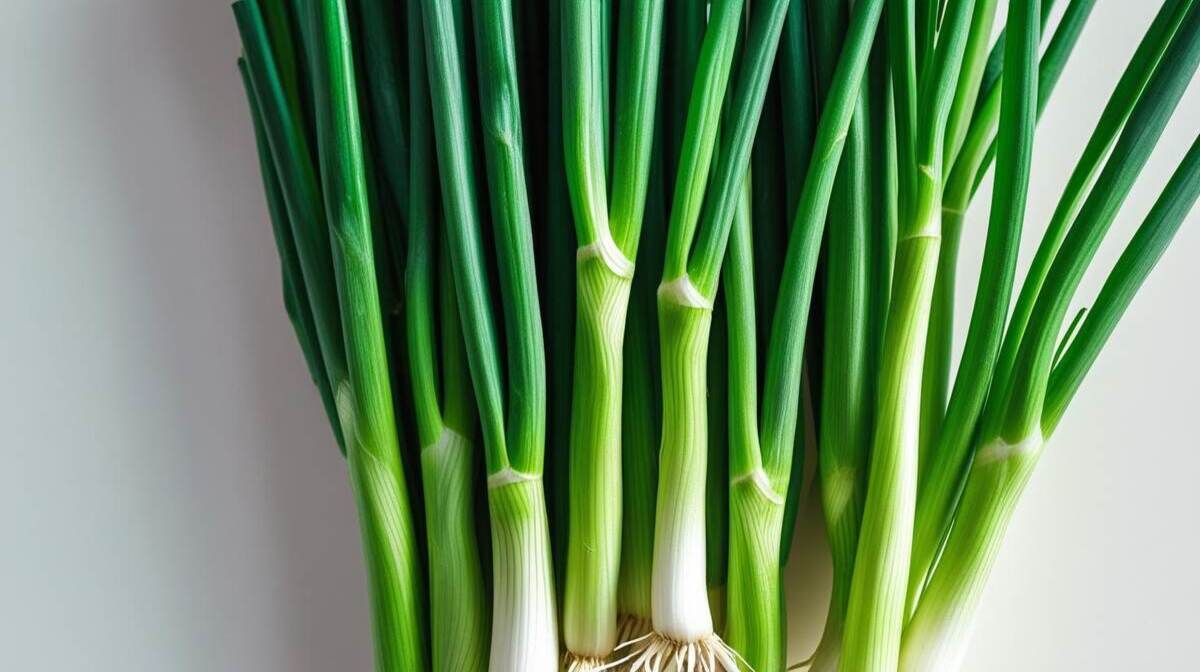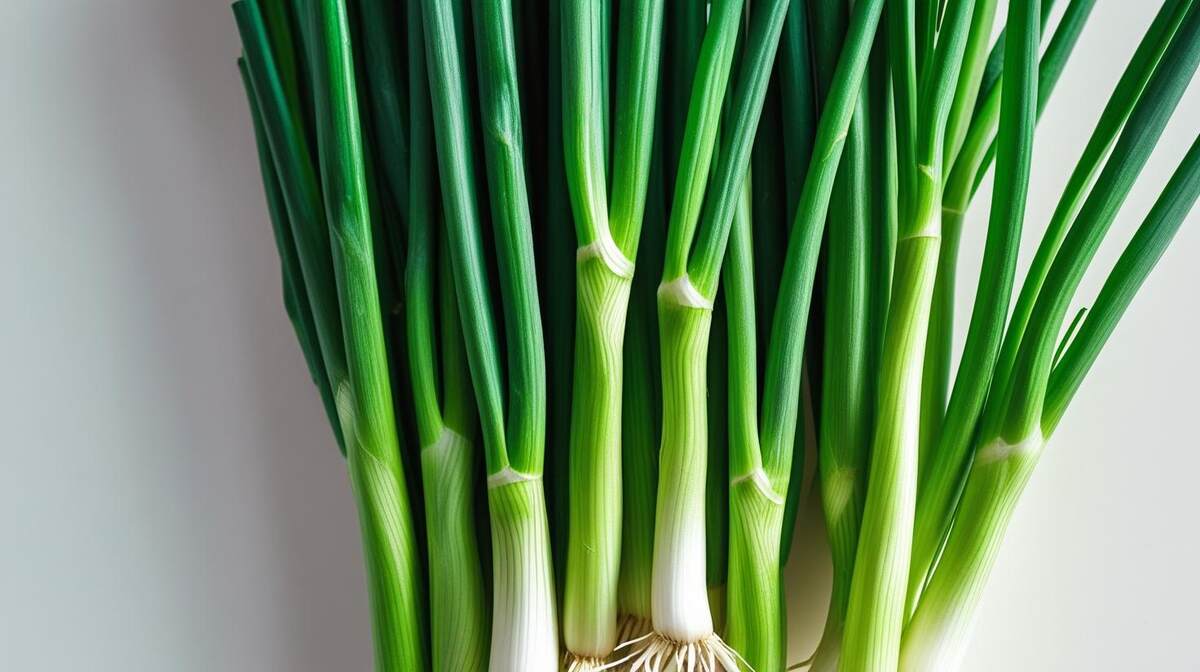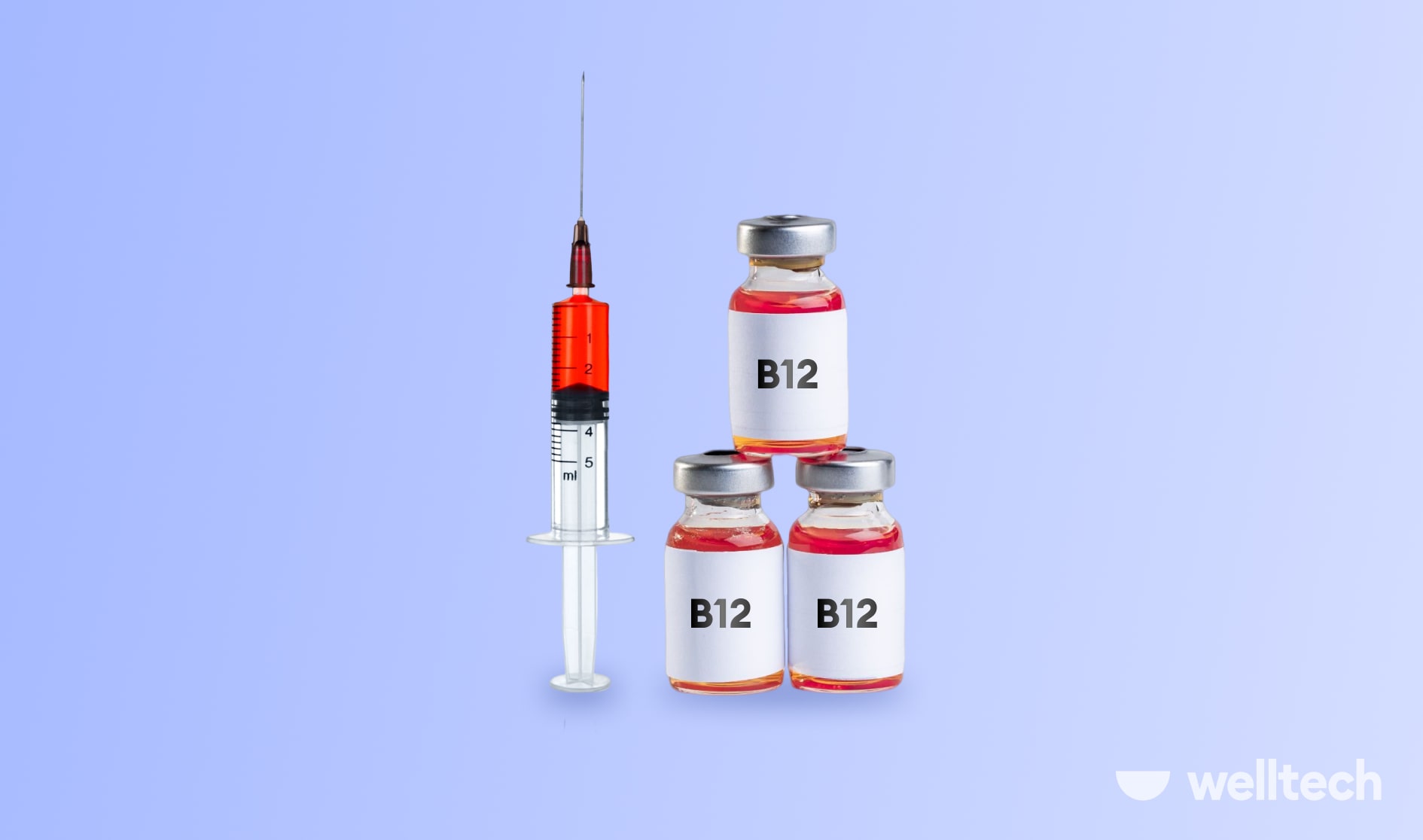Green onions, also known as scallions and spring onions, are a regular ingredient in our meals, and fortunately, they are suitable for you, not just delicious! So whether you like to toss them over soups, stir them into salads, or use them in stir-fries, your health and well-being can benefit from all things green onions.
Let’s explore some more health benefits of green onions and learn about the reasons it’s good to have green onions sitting next to you on your dinner plate.

Table of Contents
What Are Green Onions?
Green onion is a part of the allium family, which also includes regular onions, garlic, leeks, and chives. Regular onions grow on a large, round bulb, whereas green onions are made up of a long, slim stalk and a small end “bulb.” Both the green tops and the white bottoms are edible.
Some people refer to them as scallions or spring onions, but it’s a tall, phallic, white-pale green spear of an onion, and that’s what it is. They taste mild and faintly sweet and not as strong as standard onions. It’s why they are ideal for eating raw or cooked.
Nutrition Facts
Green onions are low in calories but rich in essential nutrients. Here’s what you get in about one cup (100 grams) of chopped green onions:
| Nutrient | Amount per 1 cup (100g) |
| Calories | 30 |
| Protein | 3.3 g |
| Fat | 0.7 g |
| Carbohydrates | 4.4 g |
| Fiber | 2.5 g |
| Vitamin C | 58 mg |
| Vitamin A | 218 mcg |
| Vitamin K | 213 mcg |
| Folate (B9) | Present |
| Calcium | 72 mg |
| Iron | 1.5 mg |
| Potassium | 296 mg |
Green onions are also a source of other B vitamins, including folate, as well as magnesium, phosphorus, and zinc.
1. Boosts Your Immune System
Green onion is rich in vitamin C and a type of antioxidant known as quercetin. They help your body defend itself against germs, viruses, and bacteria. Eating scallions regularly enables you to stay healthy and recover more quickly when illness strikes.
“Scallions have high levels of vitamin C and a flavonoid, quercetin. Both can help boost your immune system and enable you to combat sickness.”

1. Supports Heart Health
Scallions contain nutrients that can help keep your heart healthy. They include potassium, which helps maintain blood pressure, and fiber, which may lower cholesterol. Onions contain antioxidants and organosulfur compounds that help to reduce inflammation and protect your blood vessels.
- Potassium helps relax blood vessels and remove extra sodium from your body, which can lower blood pressure.
- Fiber helps lower LDL (“bad”) cholesterol, reducing your risk of heart disease.
- Antioxidants, such as quercetin, help prevent damage to your heart and blood vessels.
3. Good for Your Eyes
Green onions are rich in vitamin A, beta-carotene, lutein, and zeaxanthin. These nutrients are essential for maintaining eye health and protecting them from damage caused by sunlight and screen exposure.
- Vitamin A is essential for maintaining good vision, particularly in low-light conditions.
- Lutein and zeaxanthin help protect your eyes from harmful light and may lower your risk of cataracts and age-related vision problems.
4. Helps Your Bones Stay Strong
Green onions are a great source of vitamin K, which helps your body use calcium to build and maintain strong bones. Eating foods rich in vitamin K may help lower your risk of bone problems, such as osteoporosis.
- Calcium and phosphorus in green onions also support the health of bones and teeth.
5. Aids Digestion and Gut Health
Green onions are high in fiber, which helps keep your digestive system running smoothly. Fiber adds bulk to your stool and helps prevent constipation. It also nourishes the beneficial bacteria in your gut, which are crucial for overall health.
- The type of fiber in green onions, known as fructans, acts as a prebiotic, helping the beneficial bacteria in your intestines thrive
6. May Help Control Blood Sugar
Some studies suggest that eating onions, including green onions, may help lower blood sugar levels. This is good news for individuals seeking to prevent or manage diabetes. The fiber in green onions also slows down the absorption of sugar from food, helping to maintain steady blood sugar levels.
7. Supports Healthy Weight
Green onions are low in calories but high in fiber, which helps you feel full longer. Adding green onions to your meals can help you eat less and control your weight.
- One cup of green onions contains less than 10 calories but adds a lot of flavor and crunch to your food.
8. Protects Against Some Cancers
Green onions contain antioxidants and other compounds that may help protect your cells from damage and lower your risk of certain cancers. Studies have found that people who eat more onions and allium vegetables have a lower risk of cancers like colon, throat, and prostate cancer.
- Quercetin and other antioxidants in green onions help fight inflammation and protect your cells from harmful changes.
9. Fights Infections
Onions have compounds that can support the body in fighting bacteria and viruses. Traditional medicine has long recognized the powerful use of green onions in treating colds, sore throats, and other infections.
10. Helps Prevent Anemia
Onions are a good source of iron and vitamin C. Vitamin C helps your body absorb iron from plant foods, which is necessary for making hemoglobin in your blood. This can help protect you from anemia, a condition that can occur when you work with some friends to destroy innocent red blood cells.
11. Promotes Healthy Skin
Green Onions: What doesn’t vitamin C do? The antioxidants in onions can also shield your skin from damage and are believed to help prevent wrinkles and sagging.
12. Easy to Add to Your Diet
Onions are super versatile. You can eat them raw or cooked. Here are some easy ways to enjoy them:
- Sprinkle chopped green onions on salads, soups, or baked potatoes.
- Add them to scrambled eggs, omelets, or stir-fries for a delicious addition.
- Mix them into dips, salsas, or sauces for added flavor.
- Use them as a garnish for tacos, noodles, or rice dishes.

They add a fresh, mild onion flavor to almost any meal.
Are There Any Downsides?
Green onions should be safe and healthy for most people to eat. For individuals with sensitive stomachs or irritable bowel syndrome (IBS), digesting the fiber in onions can be challenging, potentially leading to bloating or gas. If you have allergies to onions or allium vegetables, I recommend avoiding them.
Conclusion
Just because onions are a delicious topping, however, doesn’t mean that they don’t have other uses. They’re loaded with vitamins, minerals, antioxidants, and fiber, which can all help your body stay healthy in countless ways.
Whether you’re looking to strengthen your immune system or enhance heart, bone, and eye health, onions are a good choice for just about anyone. So next time you’re out shopping, pick up a bunch of onions and experiment with adding them to some of your favorite dishes – you’ll be doing your body good!
FAQs:
1. Are green onions and scallions the same thing?
Yes, onions and scallions are the same vegetable. Both terms refer to the same mild-tasting onion with a long green stalk and small white bulb.
2. Can you eat both the white and green parts of onions?
Absolutely! Both the white bulb and the green stalk are edible and delicious. The white part has a stronger flavor, while the green part is milder.
3. Do green onions help boost your immune system?
Yes, Onions are rich in vitamin C and antioxidants, which help strengthen your immune system and protect you from illnesses.
4. Are green onions good for weight loss?
Onions are low in calories and high in fiber, making them a great choice for people looking to manage their weight and feel full longer.
5. How can I add green onions to my meals?
You can sprinkle chopped green onions on salads, soups, eggs, stir-fries, baked potatoes, tacos, and more for extra flavor and nutrition.



